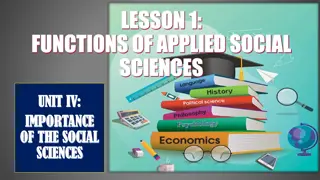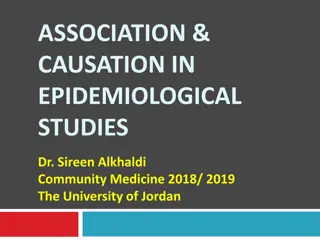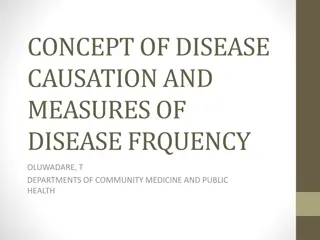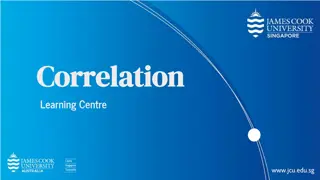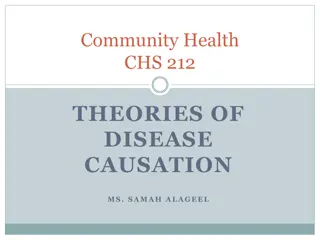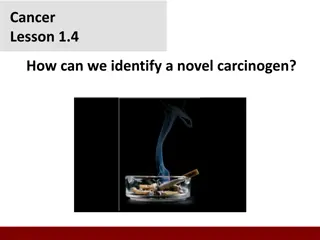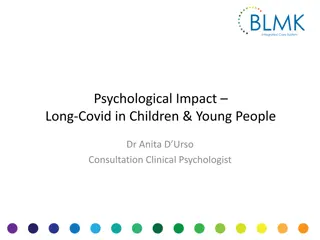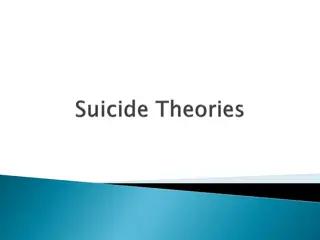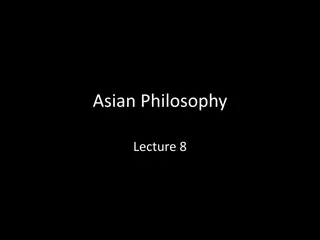Theories of Causation in Psychological and Social Sciences
Overview of theories of causation categorized into psychological, social psychological, and sociological perspectives. Psychological theories focus on instinctive, biological, and psychological qualities of abusers, including Attachment Theory, Psychodynamic Theory, Social Learning Theory, and Situational Theory. Social Psychological theories explore dynamics of interactions, family dysfunction, symbolic interactionism, and exchange theory.
Download Presentation

Please find below an Image/Link to download the presentation.
The content on the website is provided AS IS for your information and personal use only. It may not be sold, licensed, or shared on other websites without obtaining consent from the author. Download presentation by click this link. If you encounter any issues during the download, it is possible that the publisher has removed the file from their server.
E N D
Presentation Transcript
PSYCHOLOGICAL AND SOCIAL SCIENCE WEEK 2 THEORIES OF CAUSATION
THEORIES OF CAUSATION Aims Identify, explain and discuss the theories of causation Review a case study for next week to critically appraise the theories.
AETIOLOGY OF ABUSE Why? Why predisposes action Theory formation Effects Resilience
FACTORS AS TO WHY Historical Contemporaneous Cultural Situational Characteristics
WHY PREDISPOSES ACTION Immediate concerns Remedial interventions Prevention of future occurrences Use theory to guide interventions Theories may provide a framework for understanding Theory formation is either a deductive or inductive process
THEORY FORMATION Encounters abuse Explains certain phenomena Employs a theory to guide intervention Practitioner Reasoned set of propositions supported by evidence
THEORIES OF CAUSATION Overview of causation theories tend to be categorised into three main groups (Corby & Shemmings 2012 p132) Psychological theories Social Psychological theories Sociological perspectives
PSYCHOLOGICAL THEORIES Focus on the instinctive, biological and psychological qualities of those who abuse Attachment Theory: Attachment theory in psychology originates with the seminal work of John Bowlby. Psychodynamic Theory: Freudian Social Learning Theory: Behaviorists Skinner/Bandura Situational Theory: Based on dependency, the role of stress and the over burden of care; inability to remove themselves from the situation.
SOCIAL PSYCHOLOGICAL THEORIES Focus on the dynamics of the interaction Between individuals, determined by family dynamics and influenced by social networks and peers Symbolic Interactionism - meaning occurs through interaction between people. Meaning is based on experience, an interpretative process. Emphasis on the expectation of certain groups. Family Dysfunction Theory Impact of family behaviours on the behaviour of its members. It is a notion that has been popular in explaining the aetiology of a number of disorders with the basic premise that disorders arise from pathological family dynamics. Exchange Theory importance of power in relationships. Dynamics of relationships and the importance of rewards and punishment. Ecological Theory: looks at individual characteristics of abusers and their victims. The ecological perspective uses concepts from biology as a metaphor with which to describe the reciprocal dynamics between persons and their environments. Dual role of behaviours and environment - popular in Social Work. General Systems Theory systems approach to understand complex phenomena. Human behaviour is determined by the context in which they live. Hypothesis is where the environment is unfavorable the incidence of abuse is higher.
SOCIOLOGICAL PERSPECTIVES Emphasis on social conditions and the political climate as the principle reason for the existence of abuse Social Construct Theory society creates an understanding of groups and their expected behaviour by creating beliefs about how individuals learn. Social Cultural Perspective linkages between child abuse and general social approval of the use of violence to maintain control and order. Social Structural Perspective General inequalities in societies contribute to abuse. Relates to social structure, exclusion and disadvantage that are causative factors of abuse. Feminist Perspective patriarchal nature of society has a major role in the causation of abuse.
THEORETICAL APPROACHES Remember! Theories are a tool to guide understanding Each theory has it s own strengths and weaknesses however each approach alone is unable to fully encompass the reasons why abuse occurs. The ability to analyse some theories are a crucial aspect to informing your report
EFFECTS OF ABUSE Stockholm Syndrome (1973) Psychological sequelae Disturbed relatedness Disassociation Physical sequelae Life experience shapes cognitive schemas conversely cognitive schemas shape life experiences. Resilience (child abuse)
RESILIENCE Normal development under difficult conditions A capacity to do well despite adverse experience Resilient factors; being female, secure attachment, outgoing temperament, sociability, problem solving skills, assertive & supportive peer group Protective environment Importance of a significant other Sense of self effectiveness
REFERENCES Baumhover, L. A. & Beall, S. C. (1996) Abuse, Neglect and Exploitation of Older Persons. London. Jessica Kingsley Publishers. Brammer, A. (2014) Safeguarding Adults. [E-book] Available online: http://www.dawsonera.com/depp/reader/protected/external/AbstractView/S978113 7289964 (accessed September 26, 2017). Corby, B, and D. Shemmings. (2012) Child Abuse: An Evidence Base for Confident Practice. [E-book] 4th ed. Milton Keynes. Open University Press. Available online: http://www.dawsonera.com/depp/reader/protected/external/AbstractView/S978033 5245109Accessed 19/09/17. Larkin, M. (2009) Vulnerable Groups in Health & Social Care. Sage. London. Shemmings, D. (2011) Understanding Disorganised Attachment: Theory and Practice for Working with Children and Adults. London. Jessica Kingsley.
TASK FOR 7THFEBRUARY 2019 Identify a case study (use a high profile case) which you will research. Please use a case study relevant to your area of practice. Link to incidence & prevalence of your identified area. Apply two theories of causation in an attempt to explain your case study. Present your information to the group on a PowerPoint



